Covid world: Vaccines considered for 6-month-old babies as US ‘restricts’ J&J jab in adults
Babies as young as 6-months-old could receive the Covid vaccine under a new plan, even as the US announced major restrictions to the Johnson & Johnson jab.

Coronavirus
Don't miss out on the headlines from Coronavirus. Followed categories will be added to My News.
Babies as young as six-months-old could receive the Covid vaccine under a plan being considered by the European Union’s drug watchdog.
The European Medicines Agency (EMA) is assessing the possible use of Moderna’s Covid-19 vaccine for children from six-months to five-years-old - the only group not currently eligible in most countries.
“We have just started the evaluation of an application from Moderna to extend the use of Spikevax to children,” said Marco Cavaleri, head of anti-infectives and vaccines at the European Medicines Agency (EMA).
“This is the first application for this young age group,” Cavaleri said. In February, the EMA’s human medicines committee had already recommended granting an extension of indication for the Spikevax vaccine to include use in children aged six to 11.
The jab, developed by US-based biotech firm Moderna, had already been approved for adults and children aged 12 and above.
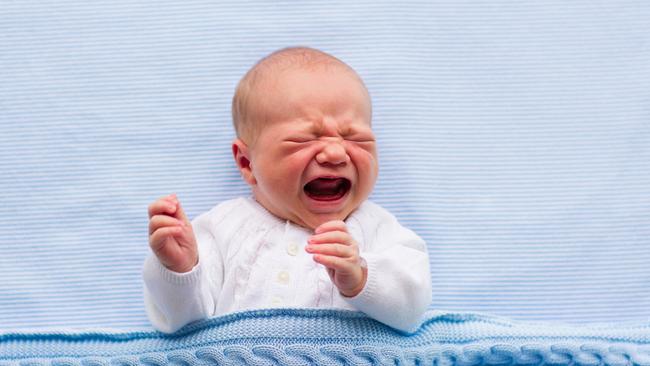
Only last week, Moderna submitted a request for an emergency use authorisation in the United States for Spikevax for children aged six months to under six years, saying that the jab was safe and produced a strong immune response.
Young children are less vulnerable to Covid-19 than older people but can still fall ill and transmit the virus.
They can also develop severe cases of paediatric multisystem inflammatory syndrome (MIS-C), which can affect the heart, blood vessels and other organs.
The Amsterdam-based EMA has so far approved five coronavirus vaccines for use in the EU: Pfizer and Moderna, which use messenger RNA technology, AstraZeneca and Johnson & Johnson, which use viral vector technology, and Novavax, which is based on a spike protein produced in a laboratory.
As of the end of last year, Covid-19 had caused the deaths of 13-17 million people worldwide, a much bigger number than the official total, according to a new estimate by the World Health Organisation.
US ‘RESTRICTS’ VACCINE IN ADULTS
The risk of rare but serious blood clots has prompted US regulators to apply strict limitations on the Johnson & Johnson’s Covid-19 vaccine.
Only adults who can’t receive an alternative vaccine, or who specifically request Johnson & Johnson’s vaccine receive it, the Food and Drug Administration said in a statement.
US authorities recommend Americans start their Covid-19 vaccinations with the Pfizer or Moderna shots instead.
According to the statement, the FDA decided to restrict Johnson & Johnson’s vaccine after further investigating the data on the risk of life-threatening blood clots within two weeks of vaccination.
The vaccine was initially considered an important tool in fighting the pandemic because only one shot is required, but the single-dose option proved less effective than two doses of the Pfizer and Moderna vaccines.
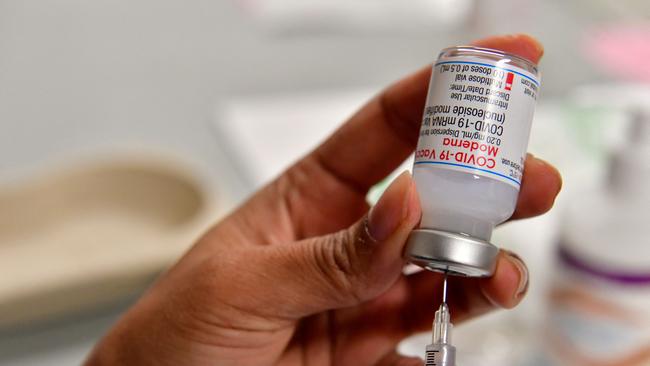
COVID HAS KILLED 17 MILLION, TRIPLE PREVIOUS ESTIMATES: WHO
The Covid-19 pandemic killed 13.3 to 16.6 million people in 2020 and 2021, the WHO estimated, up to triple the number of deaths officially attributed to the disease.
The World Health Organization’s long-awaited estimate of the total number of deaths caused by the pandemic -- including lives lost to its knock-on effects -- finally puts a number on the broader impact of the crisis.
The figures give a more realistic picture of the worst pandemic in a century, which has killed around one in 500 people worldwide and continues to claim thousands of lives each week.
“The full death toll associated directly or indirectly with the Covid-19 pandemic between January 1, 2020 and December 31, 2021 was approximately 14.9 million (range 13.3 million to 16.6 million),” the UN health agency said.
The figures are extremely sensitive due to how they reflect on the handling of the crisis by authorities around the world, with some countries, notably India, already contesting the far higher numbers.
India’s reported Covid-19 deaths for 2020-21 are 481,000, but the WHO’s estimated total figure is 3.3 million to 6.5 million.
These sobering data not only point to the impact of the pandemic but also to the need for all countries to invest in more resilient health systems,” WHO chief Tedros Adhanom Ghebreyesus said.
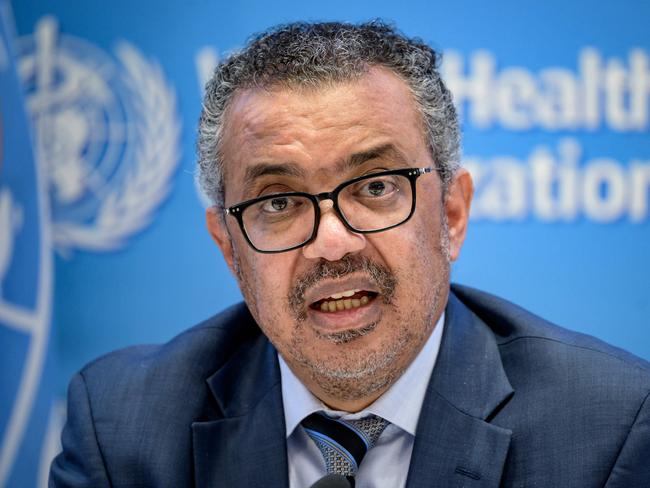
The WHO said that most of the excess deaths -- 84 per cent -- were concentrated in south and southeast Asia, Europe and the Americas.
Indeed, 10 countries alone accounted for 68 per cent of all excess deaths: Brazil, Egypt, India, Indonesia, Mexico, Peru, Russia, South Africa, Turkey and the United States.
High-income countries accounted for 15 per cent of the excess deaths; upper-middle-income nations 28 per cent; lower-middle-income states 53 per cent; and low-income countries four per cent.
The global death toll was higher for men than for women -- 57 per cent male and 43 per cent female.
And 82 per cent of the excess deaths were estimated to be people aged over 60. “
The WHO believes that generally, six in 10 deaths worldwide are not formally recorded.
The WHO said the 14.9-million figure was produced by leading world experts who developed a methodology to generate estimates where data is lacking.
HONG KONG TRAVEL REOPENING A ‘NIGHTMARE’
Hong Kong’s stringent pandemic travel restrictions, including frequent flight bans, are a “nightmare” despite a recent easing of the rules, according to business groups.
The Australian and European chambers of commerce have criticise the city’s “circuit breaker” mechanism for flights, which temporarily suspends a route when an aircraft brings in too many infected passengers.
“Almost daily, our members and other residents have been reporting that they are unable to find their way back to Hong Kong or see their business travel being cancelled,” European Chamber of Commerce said in a letter to Carrie Lam.
“Many of us are giving up,” the business chamber said, adding that the policy was a “nightmare” for travellers.
The Australian Chamber of Commerce last week recommended that Hong Kong follow the lead of Singapore or Japan by lowering quarantine requirements for business travellers.
The group also said the circuit breaker mechanism “unfairly punishes” passengers, businesses and airlines.
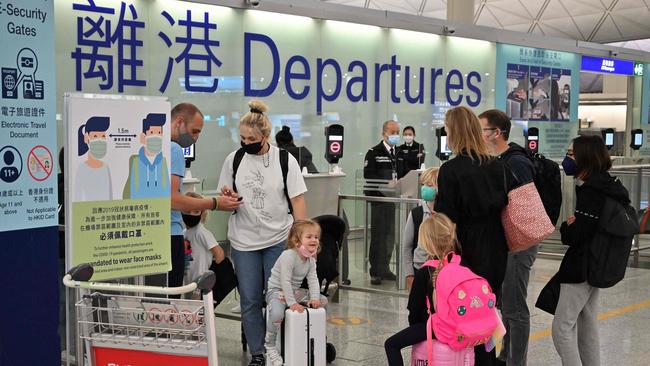
“The critical ongoing impact of the circuit breaker mechanism is to cause significant uncertainty for potential travellers, businesses and airlines, for no apparent public health benefit,” Austcham wrote in a letter to Lam.
Restrictions need to be eased urgently for Hong Kong to “remain relevant to international business and retain talent needed to support its position as an international financial centre”, the group added.
Lam said last week that the city had no plans to further relax border controls as they were needed to reduce imported infections.
Despite reopening its borders to nonresidents starting May 1, Hong Kong has recorded only a trickle of international visitors.
Daily coronavirus infections in Hong Kong have fallen back to triple digits as the city moves past an Omicron-fuelled wave that has killed more than 9,000 people since January.
But the city remains internationally isolated as it hews to a lighter version of China’s zero-Covid strategy.
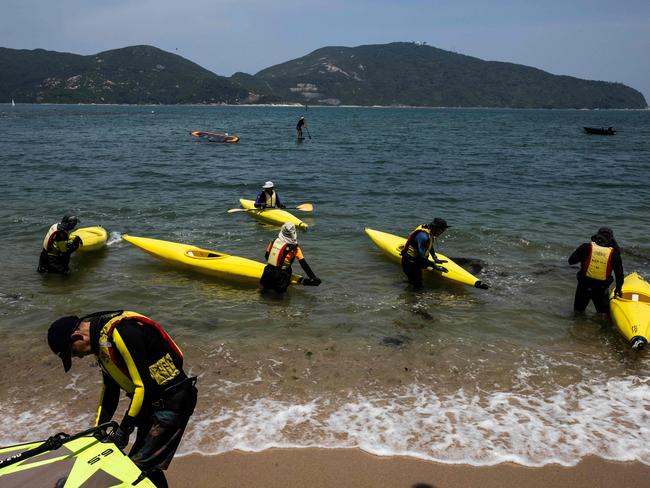
Hong Kong’s government recently eased some measures, reducing mandatory hotel quarantine for all arrivals to seven days, down from 14.
It has also allowed nonresidents to fly into Hong Kong for the first time in two years.
However, any airline that brings in five or more positive cases is banned from flying that route for five days.
Eurocham said the flight suspension mechanism has caused “constant cancellations”, with some European airlines halting flights to Hong Kong entirely due to the policy.
The Asian finance hub has issued more than 80 temporary bans on flight routes this year.
Eurocham also called on the government to lift on-arrival quarantine, noting that locals who test positive are allowed to self-isolate at home but those arriving from overseas cannot.
Hong Kong’s next leader John Lee on Thursday said the government must balance virus controls with the need for economic development, adding that the city’s competitiveness hinges on access to both China and the world.
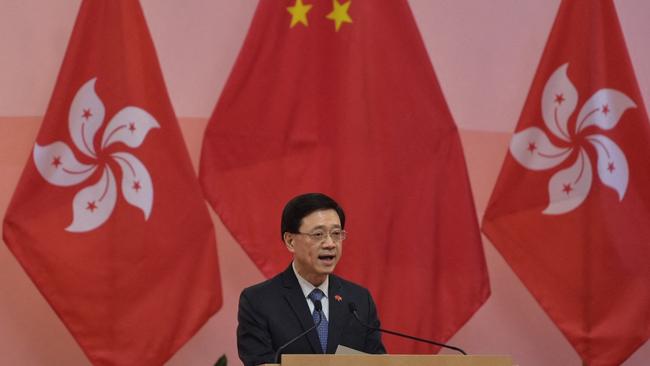
Speaking after a meeting with foreign business leaders, Lee acknowledged that the travel curbs are “causing some inconvenience” and that he would aim to provide clarity and certainty.
“It is a balancing act... The aim is to make (Hong Kong) accessible so that economic activities can take place as much as it can,” Mr Lee said.
BEIJING NOW A ‘SEMI-CLOSED STATE’
Beijing has closed subway stations and expanded Covid restrictions, constricting movement around the Chinese capital despite logging only dozens of daily cases.
China has been battling its worst coronavirus flare-up since the early days of the pandemic, with most cases found in the business hub of Shanghai.
Scenes of chaos and anger at weeks of stay-at-home orders in Shanghai have alarmed people in the capital, who fear their city may be next.
On Wednesday Beijing reported 51 local infections, five of them asymptomatic, while Shanghai reported nearly 5,000 - part of a downward trend as the hub loosens some restrictions.
But municipal government spokesman Xu Hejian told reporters Wednesday that the capital would “temporarily extend” its tightened Covid curbs - including a ban on restaurant dine-ins and suspension of entertainment venues and gyms.
Officials initially said the ramped-up curbs would apply to the traditionally busy Labour Day break ending Thursday.
“The whole district of Chaoyang and companies in areas where public transport operations have been adjusted will implement home office from May 5,” Xu added, referring to Beijing’s most populous district.
Housing compounds where infections have been reported have already been locked down, while Beijingers have started stocking up on essentials over worries they could suddenly be ordered to stay home.
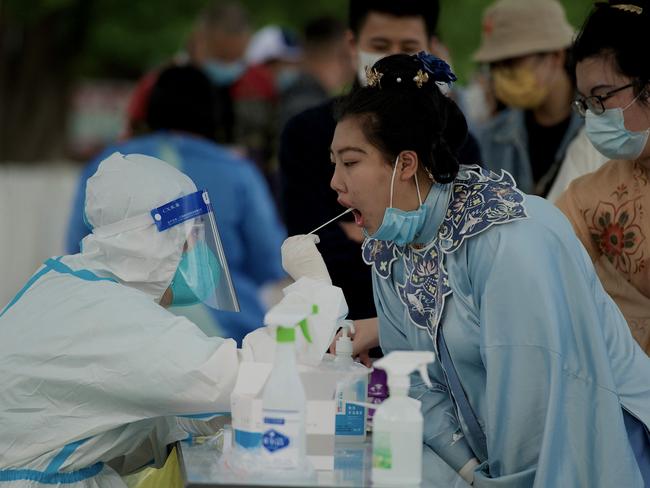
The China World Trade Center - an office and shopping complex -was also temporarily closed this week.
Meanwhile, the city’s subway operator and officials announced the closure of about 60 stations Wednesday - around 18 per cent of the network -- many of them near locked down areas.
“The entrances and exits of stations will be closed... but transfers can be done within the stations,” said a notice on the Beijing Subway’s WeChat page.
But authorities also appeared to ease some rules, with Xu saying that eligible international arrivals to Beijing could do 10 days of centralised quarantine and a week of home isolation, down from 21 days of quarantine.
“I think the city is already in a semi-closed state,” said one Beijing resident in a sealed compound who declined to be identified. “There is no timetable for when our lockdown will be lifted, and more places are being sealed,” he told AFP, saying freedoms were increasingly being limited
COVID HOSPITALISATION AKIN TO 20 YEARS AGEING: STUDY
Hospitalisation due to Covid-19 could result in cognitive decline comparable to 20 years of post middle-age ageing, research has revealed.
Cambridge University professor David Menon reported the findings, based on the examination of 46 patients, in the eClinicalMedicine journal.
Around two thirds of hospitalised patients were also likely to suffer from ‘long Covid’, according to the UK research, with just a third feeling fully recovered – physically and cognitively – after 12 months.
The degree of future cognitive impairment was directly linked to the severity of the illness.
To determine the findings, Prof Menon and his colleagues examined the results of cognitive tests performed by the patients on average six months after they were admitted to hospital. Sixteen of the patients received mechanical ventilation while in hospital.
The results were compared with 460 people who had never had Covid, with 10 people matched for each patient, according to features such as age, gender, education and first language.
The results show hospitalised Covid patients demonstrated slower processing speed and difficulty with verbal reasoning.
While the cognitive impairments were distinct, the study suggested the magnitude of the decline was similar to what occurred as people aged from 50 to 70 years of age.
There was no notable difference in the level of cognitive impairment between those who completed the tests six months after hospital admission and those who tested at 10 months, though there was some slight improvement.
COVID PATIENT DECLARED DEAD FOUND ALIVE
A Covid patient declared dead by nursing home staff was found to be alive just moments after he was picked up by morgue workers for transport to a crematorium.
In the bizarre footage shared across Chinese social media, baffled workers can be seen unzipping a body bag after staff noticed movement as it was put in a hearse.
The clip shows officials in protective gear hauling a yellow body bag from the hearse.


They can be heard telling staff to open it and one person says: “You come here and see if he’s dead? He is still breathing! Didn’t you see he’s moving?.”
The unverified footage from May 1 then shows the body bag being peeled back – revealing the elderly man is indeed still alive.
A person then tells the staff: “He is alive, don‘t cover his face ever again.”
The man was then wheeled back into the nursing home before being taken to hospital for a check-up.


He is understood to be in a stable condition as authorities investigate the incident after the nursing home issued an apology.
It comes after Shanghai was plunged into the world’s strictest Covid lockdown more than five weeks ago, with Chinese authorities justifying it as a way to get the city‘s cases under control.
The cruel approach to handling Covid has rocked the 26 million people in the city to its core, sparking mass panic, anxiety and outrage among horrified residents.
CHIEF CAUSE OF FUTURE PANDEMICS REVEALED
Climate change will drive animals towards cooler areas where their first encounters with other species will vastly increase the risk of new viruses infecting humans, raising the threat of another pandemic, researchers have warned.
There are currently at least 10,000 viruses that have the capacity to cross over into humans “circulating silently” among wild mammals, mostly in the depths of tropical forests, according to a study published in the Nature journal.
But as rising temperatures force those mammals to abandon their native habitats, they will meet other species for the first time, creating at least 15,000 new instances of viruses jumping between animals by 2070, the study forecasted.
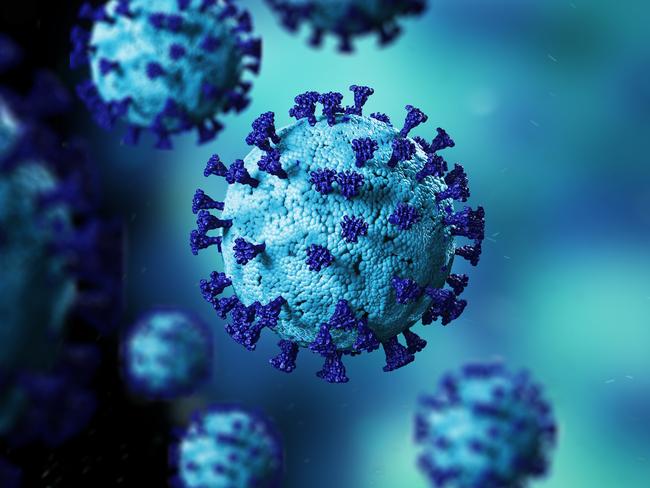
This process has likely already begun, will continue even if the world acts quickly to reduce carbon emissions and poses a major threat to both animals and humans, the researchers said.
“We have demonstrated a novel and potentially devastating mechanism for disease emergence that could threaten the health of animal populations in the future, which will most likely have ramifications for our health too,” said study co-author Gregory Albery, a disease ecologist at Georgetown University.
“This work provides us with more incontrovertible evidence that the coming decades will not only be hotter, but sicker,” Albery said.
The study, five years in the making, looked at 3,139 species of mammals, modelling how their movements would change under a range of global warming scenarios, then analysing how viral transmission would be affected.
They found that new contacts between different mammals would effectively double, with first encounters occurring everywhere in the world, but particularly concentrated in tropical Africa and Southeast Asia.
WHERE THE NEXT VIRUS WILL COME FROM
Global warming will also cause those first contacts to take place in more highly populated areas, where people “are likely to be vulnerable, and some viruses will be able to spread globally from any of these population centres”.
Likely hot spots include the Sahel, the Ethiopian highlands and the Rift Valley, India, eastern China, Indonesia, the Philippines and some European population centres, the study found.
The research was completed just weeks before the start of the coronavirus pandemic, but emphasised the unique threat posed by bats, in which Covid is believed to have first emerged.
As the only mammal that can fly, bats can travel far greater distances than their land-bound brethren, spreading disease as they go.
Bats are believed to already be on the move, and the study found they accounted for a large majority of potential first encounters with other mammals, mostly in Southeast Asia.
Even if the world does massively and quickly reduce its greenhouse gas emissions – a scenario that still seems some way off – it might not help for this problem.
The modelling showed that the mildest climate change scenarios could lead to more cross-species transmission than the worst-case scenarios, because slower warming gives the animals more time to travel.
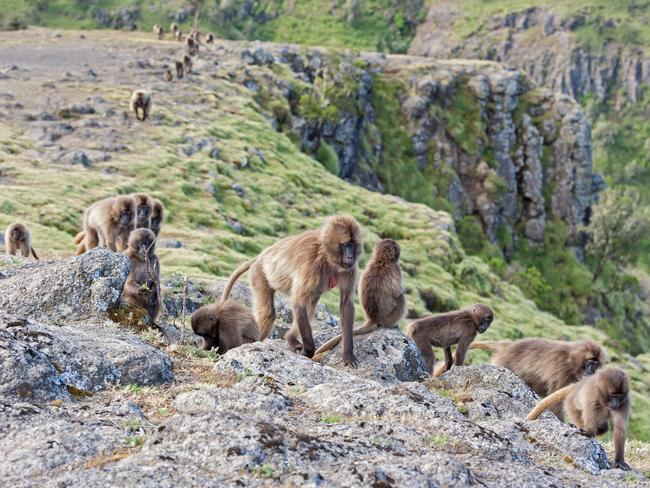
The researchers also tried to work out when the first encounters between species could start happening, expecting it would be later this century.
But “surprisingly” their projections found that most first contacts would be between 2011-2040, steadily increasing from there.
“This is happening. It is not preventable even in the best-case climate change scenarios, and we need to put measures in place to build health infrastructure to protect animal and human populations,” Albery said.
The researchers emphasised that while they had focused on mammals, other animals could harbour zoonotic viruses – the name for viruses that jump from animals to humans.
They called for further research on the threat posed by birds, amphibians and even marine mammals, as melting sea ice allows them to mingle more.
The study’s co-author Colin Carlson, said climate change is “creating innumerable hot spots of future zoonotic risk – or present day zoonotic risk – right in our backyard.”
“We have to acknowledge that climate change is going to be the biggest upstream driver of disease emergence, and we have to build health systems that are ready for that.”
BILL GATES’ STARK COVID WARNING
Microsoft billionaire Bill Gates has issued a stark warning that there is way “above five per cent” risk the world has not yet seen the worst of the Covid pandemic.
While the tech mogul admitted he didn’t want to sound “doom and gloom”, he said there was a risk that an “even more transmissive and even more fatal” variant could be generated.
“We’re still at risk of this pandemic generating a variant that would be even more transmissive and even more fatal,” he told the Financial Times.
“It’s not likely, I don’t want to be a voice of doom and gloom, but it’s way above a 5 per cent risk that this pandemic, we haven’t even seen the worst of it.”
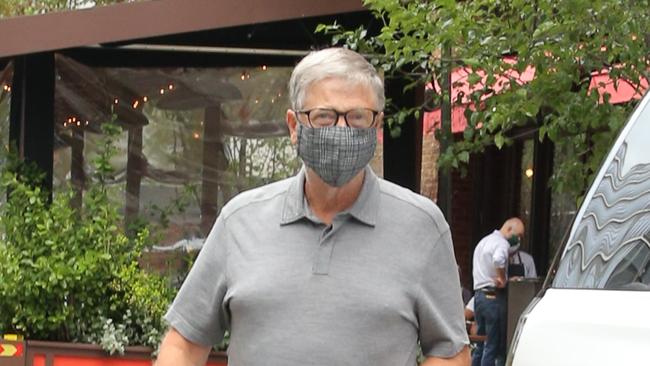
It is not the first time Mr Gates has made such a prediction.
He has been a prominent figure in the pandemic, having warned of a global outbreak back in 2015.
And in December 2021, he warned his millions of Twitter followers to brace themselves for the worst part of the pandemic.
More than six million people have been killed worldwide from Covid-19 since March 2020, but case numbers and deaths have been dropping in recent weeks.
The 58-year-old is now calling for the development of longer-lasting vaccines while urging world leaders to put funding into preparing the world for future health threats.
Gates is releasing his new book How to Prevent the Next Pandemic on Tuesday.
OPRAH WINFREY STILL FEARS COVID, SLAMS MASK RULE
Oprah Winfrey has slammed a court ruling that lifted the mask mandate for public transportation, saying “it’s too soon” to remove Covid-19 restrictions.
Discussing her new documentary “The Color of Care with the Los Angeles Times, the veteran talk show host also revealed she spent 332 days in her home without leaving during the peak of the pandemic.
The 68-year-old, who quarantined at her $40 million mansion in Santa Barbara, California, told the outlet she is not quite ready just yet to let go of precautions.
“I personally think it’s too soon to be removing masks from planes. But that’s what people choose to do. And if I were on a commercial plane, I would be one of the people who would still be wearing my mask,” she said.

“And I would be one of the people still wearing my masks in an enclosed building with people who I didn’t know if they were or were not vaccinated.
“But that is just me. And I certainly accept that there are other people who disagree. I’m OK with that as long as I can wear mine.”
Several airlines dropped mask mandates after US District Judge Kathryn Kimball Mizelle in Tampa, an appointee of former President Donald Trump, struck down the Biden policy on April 18.
In Judge Mizelle’s 59-page ruling, she suggested that the mandate – in which noncomplying travellers are ’forcibly removed from their aeroplane seats, denied board at the bus steps, and turned away at the train station doors’ – was akin to ’detention and quarantine,’ CNN reported.
However, the Centers for Disease Control and Prevention has since requested the Justice Department to appeal the ruling and reinstate the mask mandate after a recent spike in the BA. 2 Omicron variant cases.
Oprah — whose film airs on Sunday — said she is aware of the “immense privilege” her fame and wealth have granted her throughout the pandemic.
“One of the reasons I read all of those stories is because I am appalled, I am stunned. I don’t recognise a country where you’ve lost nearly a million people and there hasn’t been some form of remembering that is significant,” she said.
“ … There hasn’t been a communal gathering where there is acknowledgment that this has happened to us. Who are we that there is no acknowledgment, profoundly, in our society that we have lost our loved ones? And at times, we’re not even able to bury our dead.
COVID OUTBREAK BRINGS BEIJING TO A STANDSTILL
Major Beijing tourist venues were virtually deserted on Sunday, local time, and restaurant traffic ground to a standstill, as a typically bustling public holiday was overshadowed by a Covid outbreak that has shunted millions under lockdown nationwide.
China’s staunch zero-Covid policy has kept the virus at bay for more than two years but it is currently facing its worst outbreak since the start of the pandemic thanks to an Omicron-fuelled wave.
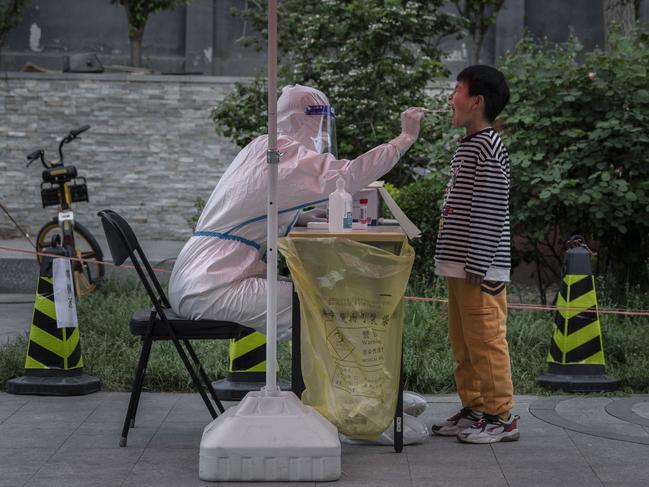
Millions across the country – particularly in economic engine Shanghai – have been pushed to stay at home for weeks, as the lockdowns have dampened economic growth and investor sentiment in the world’s second-largest economy.
Beijing so far has reported over 300 cases under the current wave, and authorities on Saturday banned citywide dining services starting Sunday to May 4 — an attempt to kerb infections during a holiday that is typically an annual peak consumption period.
“It will have a definite impact on sales,” a restaurant employee surnamed An told AFP, as she scanned for customers around Beijing’s Dongcheng district — home to historic attractions like the Forbidden City.
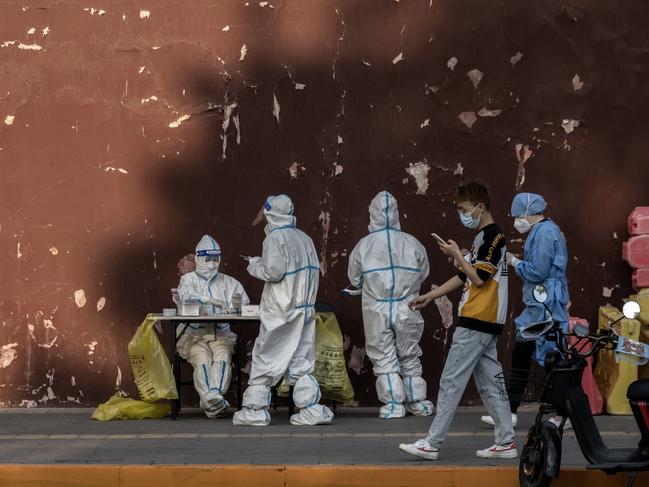
Eateries nearby were shuttered, with some only allowing customers to order takeaway if they have a negative Covid test.
This restriction is the latest measure ordered by Beijing authorities, who say all visitors to public spaces must have a negative test result within the past 48 hours.
The Temple of Heaven — one of China’s biggest historical attractions — is usually heaving with tens of thousands of visitors a day elbowing each other. But on Sunday, masked families could snap selfies without any interruptions along the imperial complex.
Instead of entering the Forbidden City, lines of people waited outside the palace complex to get a swab test — a new normal for Beijing residents.
About 30 kilometres east of the palace on the city’s outskirts, Universal Studios — Beijing’s largest Western theme park boasting a Jurassic World and Harry Potter-themed zones — announced its indefinite closure Sunday.
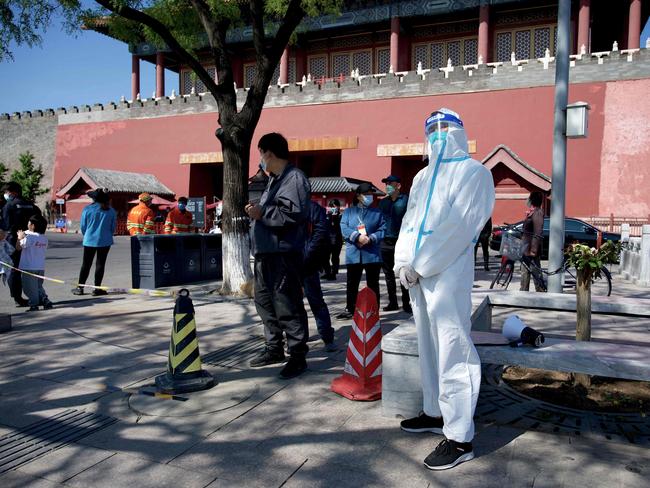
It was launched in September and has seen more than two million visitors in five months.
The Labour Day holiday was supposed to be a massive commercial coup for the park — which earlier this week had initially required a negative Covid test within 24 hours of visiting.
The capital reported 59 new infections Sunday, as officials announced the reopening of a Covid quarantine hospital that has not been mobilised since the pandemic’s first wave in 2020.
All indoor fitness activities — like public gyms and pools — were suspended starting Sunday until May 4, while authorities say about 4,000 makeshift hospital beds had been prepared and larger quarantine centres were being constructed.
“There still exists a small number of hidden infected (patients) found through community screening,” Beijing health official Pang Xinghuo said at a Sunday briefing.
“The epidemic is overall at a high plateau period.” Meanwhile in Shanghai, officials declared Sunday that “community transmission risk has been effectively curbed” and that daily infections are trending downwards.
The financial hub of 25 million has been locked down for almost a month, with residents complaining of food shortages and lack of timely medical care.
TAIWAN SAYS NO TO ‘CRUEL’ LOCKDOWN
Taiwan will not act “as cruelly as China” in imposing lockdowns, its premier said Sunday, despite surging coronavirus infection numbers.
The self-governing island recorded more than 10,000 new cases for the first time on Thursday, as the government moves from its zero-Covid strategy and begins living with the virus.
That figure hit 16,936 on Sunday.
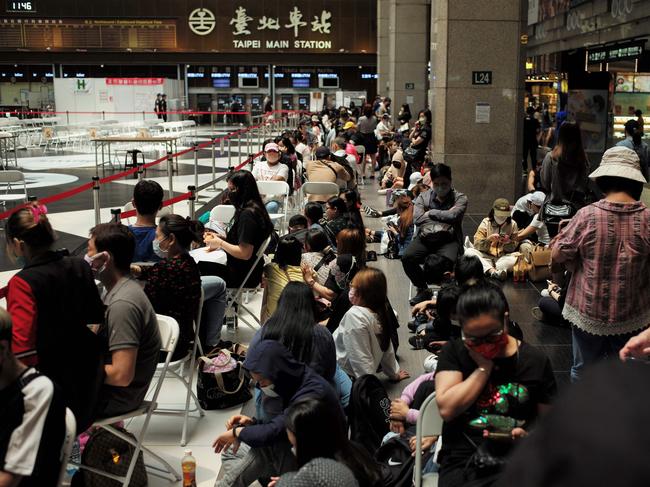
Taiwan’s shift leaves neighbouring China — including its financial hub Hong Kong — as the only major economy still sticking to a zero-tolerance policy even as Omicron breaks through defences and forces painful lockdowns.
“We will not lock down the country and cities as cruelly as China,” Premier Su Tseng-chang told reporters before a top government meeting on pandemic prevention.
“Countries all over the world have been opening up to live with the virus. Taiwan … will continue to move towards living normal lives and gradually head to a new phase in epidemic prevention,” he said at the meeting.
The barbed comment from Su — whose ruling party leans towards Taiwanese independence — comes after years of heightened tension between China and the island, which Beijing views as part of its territory.
Taiwan has largely closed its borders and implemented strict quarantine rules throughout the pandemic, keeping infection numbers low.
An outbreak last year prompted the temporary reimposition of economically painful social distancing measures until it was brought under control.
Infections are once again rising but the island’s leaders have signalled they will follow other former zero-Covid economies such as Singapore, Australia and New Zealand by opening up.
Health Minister Chen Shih-chung warned last week that Taiwan’s daily case count could more than double to 37,000 in a week.
Around 80 per cent of the population are double vaccinated, while nearly 60 per cent have taken a third shot.
Since the pandemic began Taiwan has reported 132,955 cases and 868 related deaths.
More Coverage
Originally published as Covid world: Vaccines considered for 6-month-old babies as US ‘restricts’ J&J jab in adults




